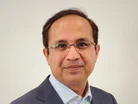TCS’ Nitin Kumar on the Security of Wearable Devices

TCS’s customers are adopting leading edge technologies, such as wearable devices and remote patient monitoring systems, powered by AI and quantum computing. These advancements offer remarkable opportunities to enhance patient care, improve diagnostic accuracy and streamline healthcare operations.
“Wearable devices enable proactive management and timely interventions,” says Nitin Kumar. “These devices collect vast amounts of sensitive personal data, including heart rate, sleep patterns, location and blood sugar levels. Since this data is transmitted wirelessly, it becomes vulnerable to interception and manipulation.”
However, through adherence to the comprehensive regulatory frameworks around interoperability, security and data privacy, devices can be safely deployed and used.
TCS enhances security in wearable healthcare devices
At TCS, device security is approached with TinyML, a technology that makes devices smarter.
“By enabling wearables and remote monitoring systems to process data directly on the device, we reduce the need to send sensitive information to external servers. The data collected for analysis is encrypted and managed within a secure zone of the device, accessible only by authorised entities through stringent access control mechanisms,” Nitin explains.
Combined with advanced technologies such as fully homomorphic encryption and secure multiparty computations, this approach allows for secure data analysis in the cloud, ensuring that both the input (patient health data) and the output of the analysis remain encrypted.
“Overall, this method not only lowers the risk of data breaches but also speeds up and improves data processing. TinyML can transform these devices into intelligent, self-sufficient tools that provide all necessary information, while keeping data secure,” he continues.
In another scenario, clinical decision support systems using data from wearables require substantial amounts of data to train the models. These models are typically used for predictive and preventive care. While utilisation of real-world data, generated from devices, would be crucial to derive insights, hospital systems typically may not be able to share data.
“In this context, we are experimenting with federated learning technologies that ensure data owners have complete control of the data,” Nitin adds. “The resulting AI models are utilising multiple local and secured datasets instead of having to move the data to centralised location thereby enhancing the security aspects of sensitive data.”
The rise of AI in healthcare has tremendous promise, while also expanding the attack surface for cybercriminals
It is clear that AI presents both opportunities and challenges in healthcare. While it significantly improves access, affordability and ethics in healthcare, it also poses challenges such as concerns related to data privacy, algorithmic bias and the ethical use of AI-driven decisions.
Despite these challenges, AI plays a crucial role in addressing these issues. Given the stringent regulations ensuring privacy and security in the healthcare sector, TCS is confident that the opportunities for AI in healthcare are immense.
“Among our customers, we see an increased adoption of AI and in any AI initiative, there is a vast amount of sensitive data that is required,” Nitin states. “These include patient records, medical images, genomic information besides others. To effectively safeguard this data, our customers are keen on exploring innovative approaches such as homomorphic encryptions.
“Our customers are increasingly adopting AI-driven solutions on interconnected devices and systems, such as IoT medical devices, telemedicine platforms and cloud-based services. Each of the connected devices or systems introduces potential entry points for cybercriminals.”
To address customer needs, TCS is actively researching and developing quantum-resistant algorithms and encryption techniques to safeguard sensitive information.
“We will help our customers harness the benefits of AI while minimising the risks,” Nitin concludes. “Secure and Privacy by design for AI systems for healthcare is the mantra with a fine balance between security vs privacy vs latency vs usability vs accuracy.”
******
Make sure you check out the latest industry news and insights at Healthcare Digital and also sign up to our global conference series - Tech & AI LIVE 2024
******
Healthcare Digital is a BizClik brand



